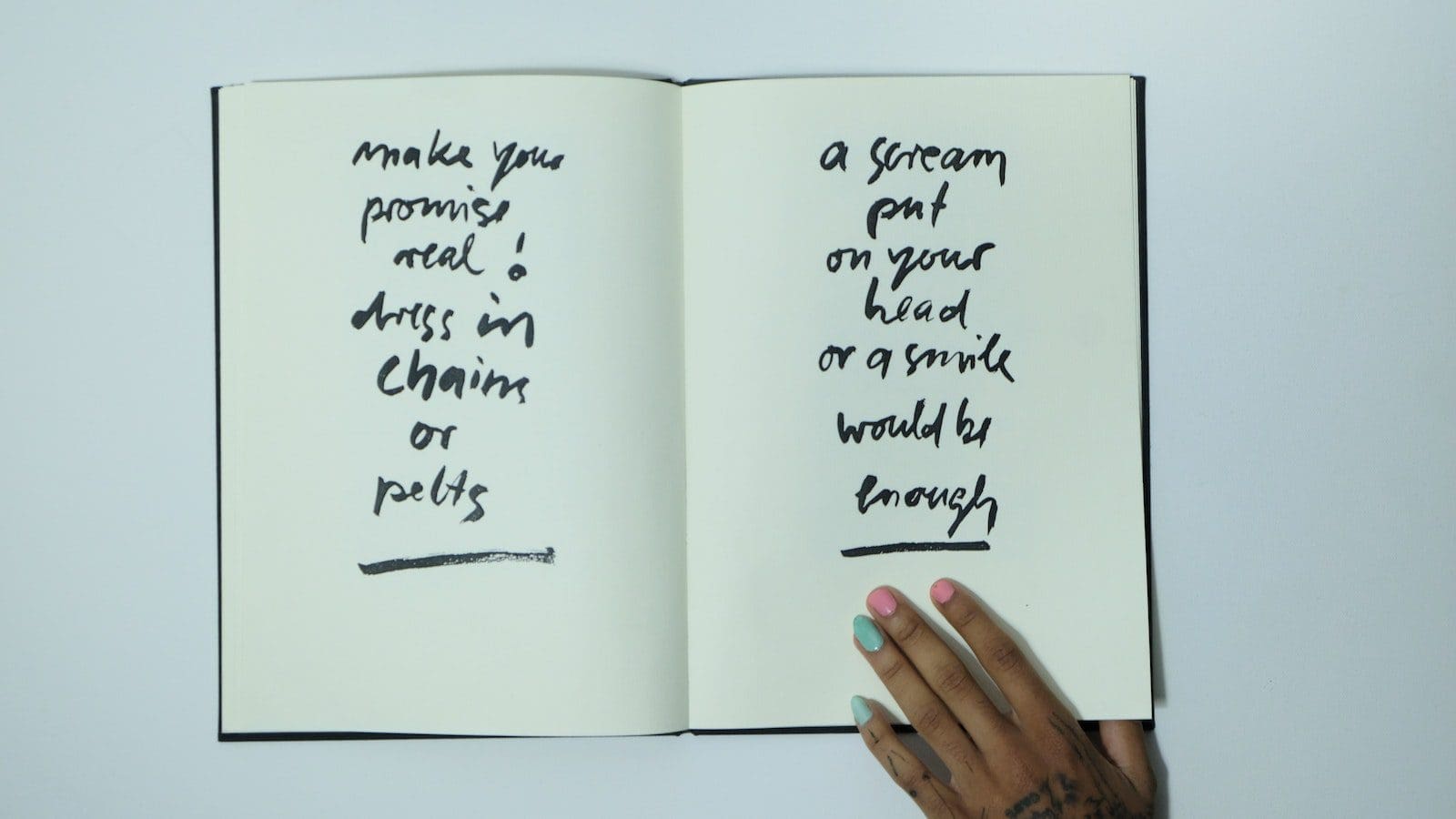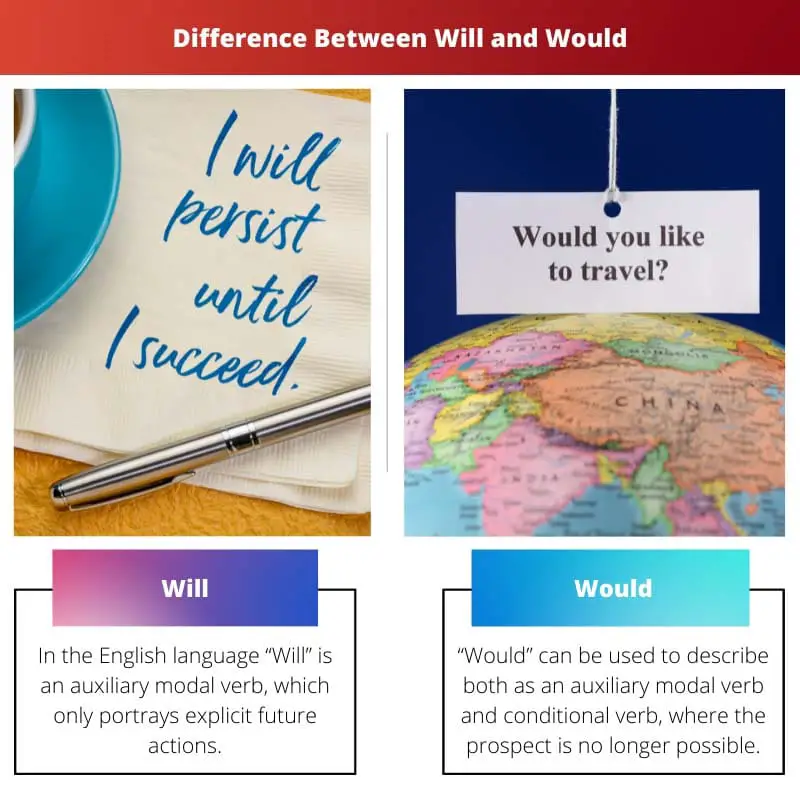“Will” is used to express future actions or predictions with certainty. “Would” is used to indicate a conditional action or a polite request in the future.
Key Takeaways
- “Will” is used to express future actions, intentions, or predictions, whereas “would” is the past form of “will” and is used to express hypothetical situations, past habits, and politeness in requests.
- “Will” is used with certainty for future events or actions, while “would” expresses uncertainty or conditions.
- Examples: “I will go to the store tomorrow” (future action) and “I would go to the store if it were open” (hypothetical situation).
Will vs Would
“Will” is used for demonstrating precise future behaviors and to ensure that an event or scenario will take place. For example, they will arrive in ten minutes. While “would” is used to describe a wish or even an imagined circumstance. For example, I would like to have steak for dinner.

Comparison Table
| Feature | Will | Would |
|---|---|---|
| Function | Modal verb | Modal verb |
| Tense | Future | Past future (hypothetical, conditional, indirect speech) |
| Certainty | High | Lower, implied possibility or uncertainty |
| Usage | * Predictions: “It will rain tomorrow.” * Intentions: “I will call you later.” * Promises: “I will help you.” * Spontaneous decisions: “I’ll have the salad.” | * Hypothetical situations: “If I won the lottery, I would travel the world.” * Conditional clauses: “They would come if they were invited.” * Indirect speech: “He said he would be here soon.” * Requests: “Would you mind opening the window?” * Offers: “Would you like some tea?” * Habits in the past: “We would go to the beach every summer.” |
| Form | Base form of verb + “will” | Base form of verb + “would” |
| Examples | I will study French. She will be here soon. We will win the game. | I would love to see Paris. What would you do if you were rich? He said he would call later. Would you mind passing the salt? |
When to Use the Word Will?
You can use the word “will” in many situations, but here are some of the most common:
To express future predictions:
- “It will rain tomorrow.”
- “The sun will set at 7 pm tonight.”
- “I think the team will win the game.”
To express intentions and promises:
- “I will call you later.”
- “I will help you study for the exam.”
- “I promise I will not tell anyone your secret.”
To make spontaneous decisions:
- “I’ll have the chicken, please.”
- “I’ll come with you to the movie.”
- “I think I’ll take a nap.”
To express willingness and offers:
- “Will you open the window for me?”
- “Would you like some more tea?”
- “I’d be happy to help you with that.”
To express present determination:
- “I will not give up on my dreams.”
- “She will succeed no matter what.”
- “We will make a difference in the world.”
To create conditional clauses:
- “If you study hard, you will pass the exam.”
- “I would be happier if I had more time.”
- “They would have gone to the party if they had been invited.”
In indirect speech:
- “He said he would be here soon.”
- “She asked me if I would help her.”
- “They told me they would never forget me.”
Here are some additional points to remember about using “will”:
- When talking about the future, “will” is used with all pronouns (I, you, he/she, we, they).
- In certain contexts, “shall” can be used interchangeably with “will” to express obligation or determination, but in modern English, “will” is more common.
- Don’t confuse “will” with “would.” “Would” is used to express past predictions, hypothetical situations, and indirect speech.

When to Use the Word Would?
The word “would” has many uses in English, but here are some of the most common:
1. Hypothetical situations:
- When talking about imaginary or unlikely situations, we use “would” to express what might happen:
If I won the lottery, I would travel the world. What would you do if you were invisible for a day?
2. Conditional clauses:
- In conditional sentences, “would” is used in the second clause to describe the result of the condition:
They would come if they were invited. I would tell you if I knew the answer.
3. Indirect speech:
- When reporting statements made in the past, we use “would” to change the future tense “will” to a past tense:
He said he would be here soon. She told me she wouldn’t forget my birthday.
4. Requests:
- “Would” can be used to make polite requests or inquiries:
Would you mind opening the window? Would you like some tea?
5. Offers:
- “Would” can be used to make offers:
Would you like me to help you with that? He offered that he would drive us home.
6. Habits in the past:
- “Would” can be used to talk about repeated actions in the past:
We would go to the beach every summer. She would always get up early and go for a run.
7. Expressing past willingness or regret:
- “Would” can be used to talk about things you were willing to do in the past or to express regret:
I would have helped you if I had known you needed it. I wish I would have studied harder in school.
8. Expressing present determination or willingness (less common):
- In some cases, “would” can be used in the present to express strong determination or willingness:
I would never give up on my dreams! She would do anything to protect her family.
Here are some additional tips for using “would”:
- When making requests, “would you mind” is considered more polite than simply saying “do you mind.”
- When using “would” to talk about the past, remember that it refers to past possible or intended actions, not necessarily actions that actually happened.
- Remember that “will” is used for expressing certainty about the future, while “would” is used for expressing less certainty or for hypothetical situations.

Main Differences Between Will and Would
Tense:
- Will: Used for the future (I will go to the store tomorrow.)
- Would: Used for the past future, in hypothetical situations (If I had wings, I would fly.)
Certainty:
- Will: Expresses strong certainty or prediction (The sun will rise in the east.)
- Would: Expresses less certainty, possibility, or intention (I would love to join you, but I’m busy.)
Function:
- Will: Predictions, intentions, promises, spontaneous decisions
- Would: Hypothetical situations, conditional clauses, indirect speech, requests, offers, past habits, past willingness/regret


The distinctions between ‘will’ and ‘would’ are very clear in the article.
I totally agree.
I will use these examples to practice the usage of ‘will’ and ‘would.’
That’s a great idea.
I strongly believe that ‘will’ expresses present determination effectively.
I will not give up on my dreams.
The article provides a clear and concise comparison of ‘will’ and ‘would.’
It’s very informative.
I would like to see more articles like this.
The article explains with clarity when to use ‘will’ and ‘would.’ I will use this guide for future reference.
Yes, the article is very instructive.
The explanation of the uses of ‘will’ is very detailed and helpful.
Absolutely.
I don’t agree with the use of ‘shall,’ it seems outdated.
I think ‘will’ is more commonly used now.
I’m with you on that one.
The article is a great source of information on the usage of ‘will’ and ‘would.’
It’s very insightful.
I couldn’t agree more!
I will study French. She will be here soon. We will win the game.
The examples in the article clearly illustrate the appropriate uses of ‘will’ and ‘would.’
They do.